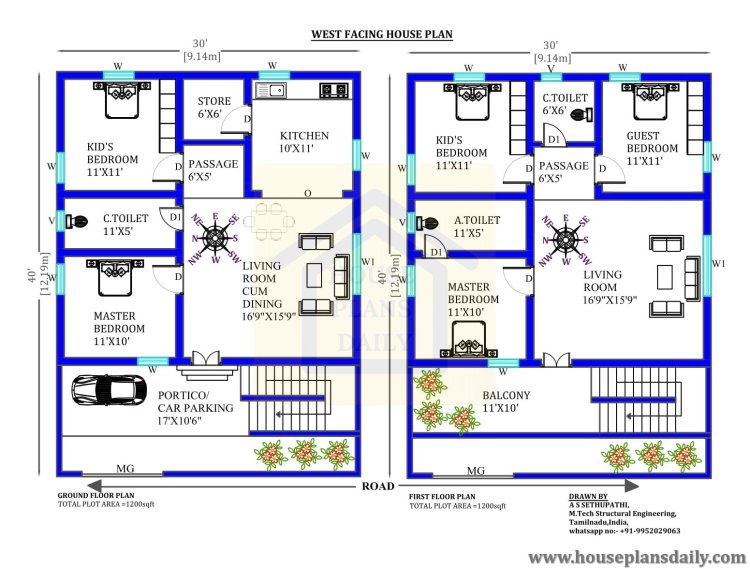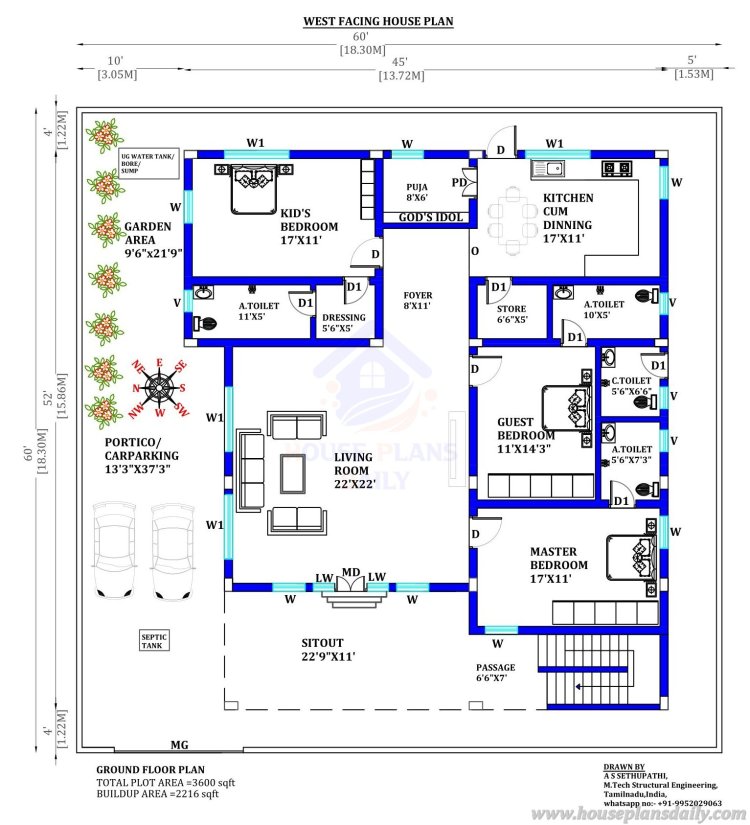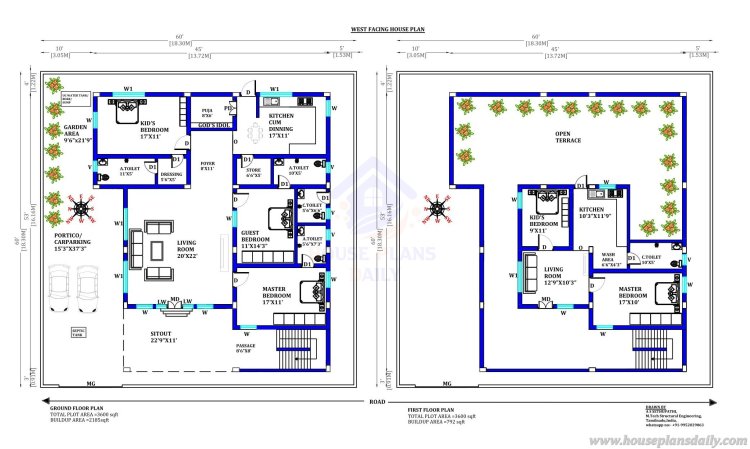West Face House Plan with Vastu | House Plans Daily
Vastu Shastra, an age-old traditional Hindu system of architecture, plays a potent role in constructing and planning buildings and homes to foster positivity and harmony.
West Face House Plan with Vastu | House Plans Daily
Vastu Shastra, an age-old traditional Hindu system of architecture, plays a potent role in constructing and planning buildings and homes to foster positivity and harmony. This principle, deeply rooted in directional alignments and energy flow, can significantly influence a dwelling's atmosphere and its occupants' well-being. This exploration delves into the fundamental ideas of Vastu Shastra, focusing on west-facing house plans, a direction often misconceived in Vastu. It seeks to demystify the key concepts to consider while designing a west-facing house, including the strategic plotting of rooms, proper alignment of entrances, and precise placement of integral spaces like the kitchen, bedrooms, and bathrooms.
Moreover, it provides detailed insights into potential Vastu challenges, usually associated with west-facing residences. This includes understanding its potential impacts on wealth and health, subsequently presenting remedial solutions to neutralize any negative influences, leading to a more balanced and harmonious home environment.

House Elevation
Understanding Vastu Shastra
In today's ultra-modern, high-tech society, there's a powerful movement placing great importance on ancient wisdom—a fantastic and often understated blend of science and art. This is the reason why the ancient architectural practice of Vastu Shastra is increasingly being considered when building houses. Let's dive into the importance of Vastu Shastra and its implications in the housing industry.
Drawing on an ancient, rich knowledge base, Vastu Shastra refers to the 'science of architecture,' an intrinsic component of the Indian culture. This segment of wisdom has proven its relevance, resilience, and impact over countless years. Its core principles revolve around designing and organizing spaces in a manner to align with the natural energies of the universe characterized by harmony and balance.
One significant point worth noting is the relevance of Vastu Shastra in harnessing positive energy. The effect of energy on human interactions and mood is an undeniable reality. Incorporating Vastu principles within a home ensure that all spaces within a house are strategically adjusted to attract and retain the positive energy flow.
Besides enriching homeowners with a constant influx of positive energy, Vastu Shastra also provides seamless harmony with nature. By aligning the layout of a house with the cardinal directions—north, south, east, and west—it ensures the optimum use of natural energy sources such as sun, wind, and water. This could directly translate into a healthier lifestyle, increased longevity, and enhanced mental wellbeing owing to the synergistic alignment with the Earth's magnetic fields.
Moreover, Vastu practices influence the prosperity of the house owners by ensuring financial stability. For instance, the east, according to Vastu, represents prosperity and therefore, making sure the home entrance faces this direction helps attract wealth. Principles like these spotlight the link between home design and the financial prospects of those living within these spaces.
It is also worth noting that the principles of Vastu Shastra affect the resale value of a house. The increasing acceptance of Vastu compliant structures in society has notedly impacted the real estate landscape. Houses built adhering to Vastu principles tend to have a more expansive market, thus securing maximum profitability for investors and homeowners.
In conclusion, the importance of Vastu Shastra in building a house cannot be understated. Whether it's harnessing positive energy, aligning with nature, ensuring financial stability, or enhancing resale value, the potential benefits of integrating Vastu principles into house construction are profound and vast. Optimally amalgamating ancient wisdom with modern construction practices demonstrates adaptability, thereby driving innovation in the housing industry. And in the ever-evolving business landscape, innovation indeed reigns supreme.

west-facing house plan
Planning a West-Facing House as per Vastu
When it comes to crafting a west-facing house plan hinged on Vastu principles, several key factors fall into play. Though Vastu Shastra, the ancient Hindu architectural practice, has been introduced and its significance underscored, it's just as crucial to get into the nitty-gritty of constructing west-facing homes based on these principles.
- Entrance Placement: In Vastu, the entrance of the house holds immense importance - it's where the primary energy flow comes from. For west-facing homes, it's preferable to have the entrance in the North-West direction. The positive vibes entering from this direction can enhance both the occupants' health and prosperity.
- Room Positioning: The layout of your rooms should adhere to Vastu norms too. The master bedroom is ideally placed in the South-West corner, the bathroom in the North-West or West areas, the kitchen ideally in the South-East, while the prayer room is best placed in the North-East corner of the house. Following these guidelines positively impacts relaxation, health, and overall well-being.
- Water Sources Placement: Vastu emphasizes the strategic location of water sources in a house. The water storage units, like water tanks and water sumps, should ideally be located in the North-East. This positioning is believed to attract wealth and maintains a sense of tranquility.
- Garage and Outbuildings Placement: According to Vastu, the positioning of the garage and outbuildings also play a part in bringing in good energy. The ideal location for a garage is the North-West side of the plot.
- Windows and Balcony: The large windows and balconies should preferably be on the North or East sides. This ensures receipt of the morning sun’s rays which are rich in ultraviolet light resulting in a healthier indoor environment.
While the concept of Vastu might seem abstract at first glance, its principles bring about tangible results. From enhancing financial stability to contributing to the overall mood and energy of the inhabitants, aligning living space with nature's rhythm can be a real game changer. This practice, bridging the old with the new, proves that business and spirituality can be mutually enhancing. As companies and developers adapt and innovate, Vastu principles could be the key to unlocking radical advancements in the housing industry.
This application of ancient wisdom isn't just for enhancing your daily lives, but can serve as an attractive selling point should you ever want to venture in the real estate market. With the correct principles in place, Vastu-based houses can command a robust resale value, making it a worthy consideration for all homeowners and builders alike. Thus, creating a Vastu-compliant west-facing home is not just about embracing old practices, it's about enhancing and innovating modern living while honoring an old tradition.

West Facing Houses
Overcoming Vastu Challenges in West-Facing Houses
Delving into the realm of west-facing homes, it's important to identify the inherent Vastu challenges that may prove inconvenient or detrimental to the homeowners. Recognizing and attending to these issues not only enhances a home’s aesthetic appeal, it may also boost its value in the real estate market, which is a significant incentive from a business perspective.
West-facing homes often face criticism due to several misconceptions. Here, the task is to debunk these myths and carve a path towards rectifying potential Vastu concerns, promoting wellness, prosperity, and stability.
The entrance, for example, is a focal element in Vastu principles. The main door of a west-facing house should preferably be located in the North West, which is deemed auspicious and welcoming to positive energies. A door that opens to a lush garden or a beautiful landscape can visually enhance the entrance while aligning with Vastu principles for energetic harmony.
Room positioning is pivotal. In a west-facing house, the children's room should ideally be in the west for it offers the requisite elements for growth and learning. The master bedroom on the western side creates an environment of peace and tranquility. Meanwhile, the kitchen, placed in the southeast, reinforces a positive energy balance, promoting health and prosperity.
Water source locations demand care while planning. Placing a borewell or a water tank in the northeast section of a west-facing house ensures a positive energy flow, which is linked to prosperity and abundance.
Meanwhile, the placement of the garage and additional outbuildings should be toward the north-west or south-east. This allows a free-flowing pathway for the entry and exit of vehicles, all while maintaining a Vastu-compliant residence.
In the context of windows and balconies, imbibe the essence of natural rhythm. Large windows and open balconies on the north and east enhance morning light reception, aligning with Vastu principles. Ensuring for sufficient aeration and sunlight, it contributes to a vibrant and healthy living environment.
Vastu principles hold the power to transform not just homes, but also the lives of those residing in them. A strategic alignment of your living space with nature's rhythm can boost health, prosperity and well-being. Simultaneously, it could encourage a higher resale value for your property.
Ultimately, the true essence of Vastu Shastra in a west-facing house lies in striking a balance - a balance between nature's elements, the house's construction, and the dweller's comfort and aspirations. As a dynamic, responsive, and innovative approach, Vastu ushers in a new, revitalizing aura that transforms homes into tranquil, harmonious and prosperous living environments.

Front Elevation
Engaging with the traditional wisdom of Vastu Shastra, we have navigated through its foundational principles and application in developing west-facing house plans. This exploration has illuminated the inherent complexities and subtle nuances of applying Vastu principles, highlighting the value of conscious design and strategic placement in cultivating a harmonious home environment. We comprehend that potential challenges can arise and that these concerns are commonly linked to aspects of wealth and health. But as we have found, these perceived hurdles offer us opportunities for growth, enabling us to counteract obstacles through practical remedies. The knowledge shared within this journey empowers anyone planning a west-facing home to create a space imbued with harmony, prosperity, and positive energy, thus underscoring the transformative power of Vastu Shastra.






















